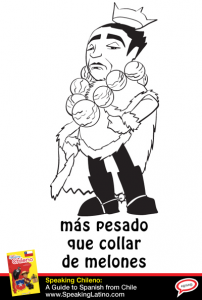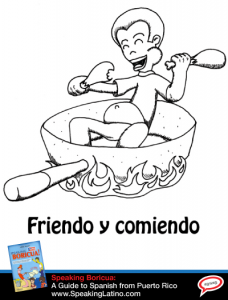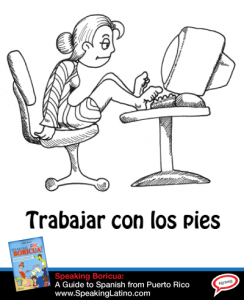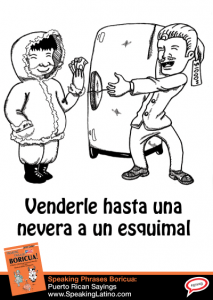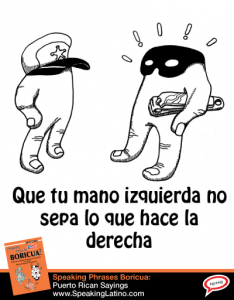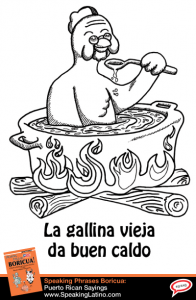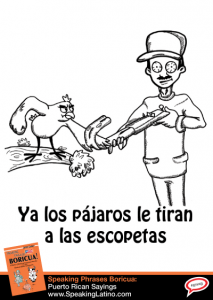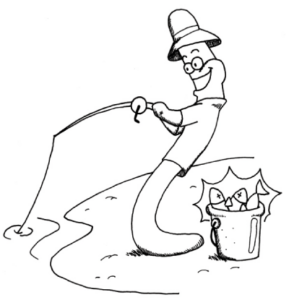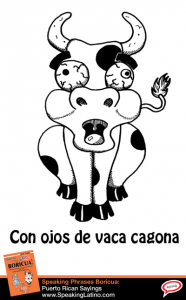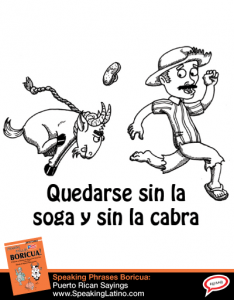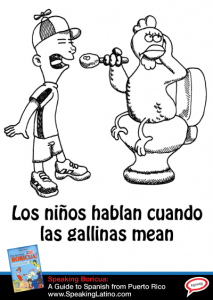Just like diminutives, augmentatives have different uses and there are several augmentative endings. These often convert everyday words into local slang. The most common Spanish Suffixes are: ón/ona, ozo/oza, and ote/ota. In Spanish, augmentatives are used to express large size or great intensity Examples: Grande – big Grandote – huge Perro – dog Perrote – […]
MÁS PESADO QUE COLLAR DE SANDÍAS / MELONES: Spanish Saying
Here is an illustration of the Spanish saying más pesado que collar de sandías (or melones) from the book Speaking Chileno. This saying is also used in Argentina. Spanish Saying: MÁS PESADO QUE COLLAR DE SANDÍA • Literal translation: Heavier than a melon necklace • Variation: Más pesado que collar de melones • Meaning: annoying, […]
FRIENDO Y COMIENDO: Spanish Saying
Here is an illustration of the Spanish saying friendo y comiendo commonly used in Puerto Rico and the Dominican Republic. This illustration is featured in the book Speaking Boricua. FRIENDO Y COMIENDO: Spanish Saying • Literal translation: frying and eating; frying while eating • Meaning: right away, in a jiffy. To do something right after […]
HACER LAS COSAS CON LOS PIES: Spanish Saying
Here is an illustration of the Spanish saying hacer las cosas con los pies or trabajar con los pies. This illustration is featured in the book Speaking Boricua because it is a common phrase used in Puerto Rico, but is also known in other Spanish-speaking countries. HACER LAS COSAS CON LOS PIES: Spanish Saying • […]
Spanish Saying: PREDICAR LA MORAL EN CALZONCILLOS
Here is an illustration of the Spanish sayings predicar la moral en calzoncillos. While this illustration is on the book Speaking Phrases Boricua, a book about sayings used in Puerto Rico, this saying is commonly used in other Spanish speaking countries as well. Spanish Saying: PREDICAR LA MORAL EN CALZONCILLOS • Literal translation: To preach […]
5 Ways to Say Sell Ice to an Eskimo in Spanish
Here is an illustration of the idiom “sell ice to an Eskimo” from the book Speaking Phrases Boricua. I have noticed that depending on the country there are a couple of variations in Spanish. Many variations will depend on the local word for refrigerator in Spanish. Sell Ice to an Eskimo Idiom in Spanish • […]
QUE TU MANO IZQUIERDA NO SEPA LO QUE HACE LA DERECHA: Spanish Proverb
Here is an illustration of a common Spanish proverb: Que tu mano izquierda no sepa lo que hace la derecha. This illustration is featured in the book Speaking Phrases Boricua. Spanish Proverb: QUE TU MANO IZQUIERDA NO SEPA LO QUE HACE LA DERECHA • Literal Translation: The left hand doesn’t know what the right hand […]
Spanish Saying: ESTAR PARA CHUPARSE LOS DEDOS
Here is an illustration of a common Spanish saying estar para chuparse los dedos that I would like to share with you. Spanish Saying: ESTAR PARA CHUPARSE LOS DEDOS • Literal translation: Finger-licking • Meaning: something tasty (food). • Example: “La pizza que me hizo mi suegro estaba para chuparse los dedos.” La pizza que […]
Spanish Sayings: GALLINA VIEJA DA BUEN CALDO
Illustration, meaning and example of the Spanish saying “gallina vieja da buen caldo.” This drawing is featured in Speaking Phrase Boricua, a book that collects and translates popular sayings and phrases used in Puerto Rico (and other Spanish speaking countries).
ESTAR EN PELOTAS: Meaning and Illustration of This Colloquial Spanish Phrase
The Spanish phrases or sayings estar en pelotas or estar en bolas are two ways to colloquially express being naked. Although this illustration is included in the book Speaking Argento: A Guide to Spanish from Argentina, this expression is also used in other countries. Colloquial Spanish Phrase: ESTAR EN BOLAS or ESTAR EN PELOTAS • […]
LOS PÁJAROS LE TIRAN A LAS ESCOPETAS: Spanish Saying Illustration, Meaning and Example
Spanish Saying: LOS PÁJAROS LE TIRAN A LAS ESCOPETAS • Literal Translation: Now the birds shoot at the shotguns • Meaning: 1. Now the roles are reversed. When a person rebels against his/her superior. 2. Used in situations to call attention to social changes over the generations, that things are the reverse that they used […]
The Spanish Language Phrase FELIZ COMO UNA LOMBRIZ in English
You will hear the Spanish language phrase feliz como una lombriz in Latin America. This expression literally translates to “happy as an earthworm.” But the correct way to say feliz como una lombriz in English is by using the phrase “happy as a clam.” In my opinion, this is one expression that sounds better in […]
CON OJOS DE VACA CAGONA: Idiomatic Spanish Slang Expression
Spanish Slang Expression: CON OJOS DE VACA CAGONA Literal English Translation: With eyes of a shitting cow Definition: Really, really scared. If you’ve never seen it, you can imagine how big the eyes of a cow get when it is straining to shit Equivalent in English: Scared shitless You can find this illustration and many others […]
Translating SIN LA SOGA Y SIN LA CABRA Spanish Phrase to English
Translating a Spanish Phrase to English: SIN LA SOGA Y SIN LA CABRA Literal: To remain without the rope and without the goat Definition: A person that tries to take or grab too much, and ends up with nothing Similar Spanish Phrases: Quedarse sin el plato y la comida Equivalent in English: Bite off more […]
Spanish Idiomatic Expression CUANDO LAS GALLINAS MEAN in English
Cuando las gallinas mean is a common Spanish idiomatic expression generally said to children when they speak when they are not supposed to. The full Spanish saying goes los niños hablan cuando las gallinas mean and literally translates to “children talk when hens piss.” For anyone that doesn’t know hens doen’t pee and this phrase […]

